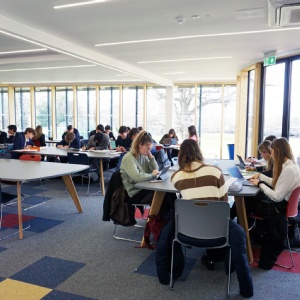Our Growing Sixth Form

Earlier this month we opened our new Sixth Form Centre to students. The eco-friendly, sustainable building was designed to evoke curiosity and creativity, with plans for a future green wall to further enhance the tranquillity of the space. It comprises a large study area for students, with meeting spaces and offices for the staff team who support them.
We have experienced organic growth in our Sixth Form over the last five years, from 390 students in 2018 to 520 students currently. Next academic year, our Sixth Form will be our largest ever as we reach our new capacity of 560 students. We have received approximately 800 applications to our Sixth Form for September (following a steady annual increase from 460 in 2019) and we look forward to inviting 280 of those students to benefit from the wonderful opportunities we offer them to 'Learn, Grow, Belong', our school's maxim, and the essence of what it means to be a student at The Judd School.
One of those opportunities is to be in a position to access the best of higher education. The vast majority of our students choose to apply to university, but the number of students accepting prestigious city apprenticeships increases annually. The likes of Bristol, Durham, Edinburgh, Leeds, LSE, Nottingham, UCL, Warwick and York feature regularly on our destination lists, but our experienced team supports every level of application, assisting students with personal statement reviews and suggestions, as well as interview preparation and practice interviews with specialists in the fields they are applying to.
Every year our students enjoy considerable Oxbridge success. This year 26 students have received offers, 8 from the University of Oxford and 18 from the University of Cambridge, which is greater than our historical five-year average of 22 offers. We received a record high 37 offers in 2017. This is a significant achievement for state school students, particularly in light of ever-increasing competition for places both nationally and internationally. This year's places are fairly evenly distributed between the Humanities (14) and the Sciences (12). Students intend reading Archaeology, Biotechnology, Classics, Engineering, English, Geography, German, Human, Social, and Political Sciences, Law, Mathematics, Medicine, Modern and Medieval Languages, Natural Sciences and Philosophy, Politics and Economics. Two of those students have been awarded organ scholarships at Emmanuel College and Girton College, Cambridge. Our subject departments have therefore played an important role in this.
To support their learning and preparation for life after school, our students run a plethora of societies, which creates a hive of activity at lunch time. Students could find themselves listening to an oncologist invited to address MedSoc, writing one of fifteen essays and opinion pieces to be published in our PEACAS Journal, presenting to fellow students on Special Primes at Maths Society or working towards our school's Green Flag Award as a member of the Eco Committee (we appointed our first Eco Prefect last year). Part of our school's statement of curriculum intent is to equip young people to be caring and responsible citizens. We aim for them to leave our gates prepared to confront the effects of international conflicts, to tackle climate change and to meet the many other challenges besetting our world.
Mr Riaan Vorster
Deputy Headteacher (Academic)
